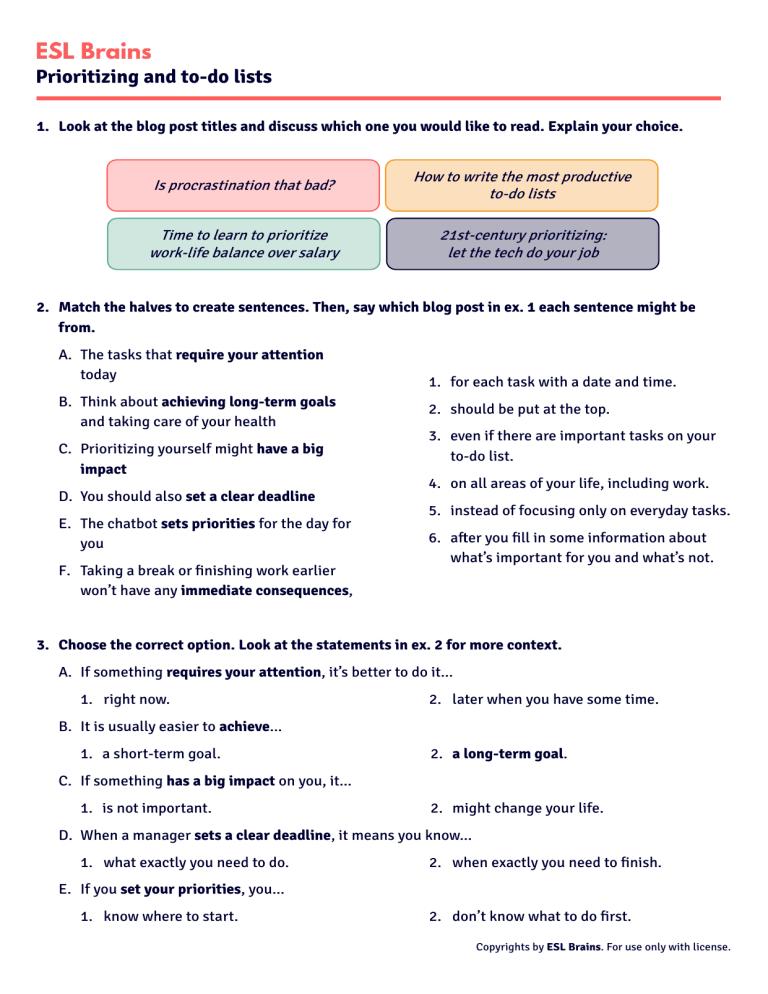
Prioritizing and to-do lists 1. Look at the blog post titles and discuss which one you would like to read. Explain your choice. Is procrastination that bad? How to write the most productive to-do lists Time to learn to prioritize work-life balance over salary 21st-century prioritizing: let the tech do your job 2. Match the halves to create sentences. Then, say which blog post in ex. 1 each sentence might be from. A. The tasks that require your attention today B. Think about achieving long-term goals and taking care of your health C. Prioritizing yourself might have a big impact D. You should also set a clear deadline E. The chatbot sets priorities for the day for you F. Taking a break or finishing work earlier won’t have any immediate consequences, 1. for each task with a date and time. 2. should be put at the top. 3. even if there are important tasks on your to-do list. 4. on all areas of your life, including work. 5. instead of focusing only on everyday tasks. 6. after you fill in some information about what’s important for you and what’s not. 3. Choose the correct option. Look at the statements in ex. 2 for more context. A. If something requires your attention, it’s better to do it… 1. right now. 2. later when you have some time. B. It is usually easier to achieve… 1. a short-term goal. 2. a long-term goal. C. If something has a big impact on you, it… 1. is not important. 2. might change your life. D. When a manager sets a clear deadline, it means you know… 1. what exactly you need to do. 2. when exactly you need to finish. E. If you set your priorities, you… 1. know where to start. 2. don’t know what to do first. Copyrights by ESL Brains. For use only with license. Prioritizing and to-do lists F. The immediate consequence of not studying English at school is… 1. not getting a job in an international company. 2. getting a bad grade. 4. You are going to watch a video about prioritizing different tasks. Before watching, explain what the difference between ‘urgent tasks’ and ‘important tasks’ is. 5. Watch the first part of the video [https://youtu.be/czh4rmk75jc] (to 01:13) and check your answer in ex. 4. 6. Complete the statements and add details. • I have heard of/used/never used the Eisenhower Matrix. • Dividing tasks into categories like ‘urgent’ and ‘important’ might/can’t make you more productive. 7. Watch the second part of the video (from 01:14 to 02:11) and complete the missing information. IMPORTANT AND URGENT IMPORTANT AND NOT URGENT Examples: project __________ , medical emergencies and problems Examples: health, __________ and dreams Strategy: do it __________ and do it now Strategy: schedule and do it as soon as __________ URGENT AND NOT IMPORTANT NOT URGENT AND NOT IMPORTANT Examples: interruptions, __________ phone calls, texts, unimportant emails Examples: watching TV, checking social media and other __________ wasters Strategy: reschedule or delegate Strategy: do it later or avoid it __________ Copyrights by ESL Brains. For use only with license. Prioritizing and to-do lists 8. Watch the final part of the video (from 02:12) and choose the correct summary. A. When you act, you know what’s important and how to set your priorities. When you react, you do unimportant things and waste your time. B. Acting and reacting are very important if you want to organize your time. You have to say yes to many things in order to set priorities that will have the biggest impact on your life. 9. Discuss the questions. • What do you like or dislike about the matrix? • Do you ever get into a reactive mode? How does it make you feel? • What is the key to achieving long-term goals? • Is it easy for you to do tasks that don’t have a clear deadline? • How often do you create to-do lists? Do you do it on paper or in an app? • Do your priorities sometimes change? If so, how do you know when to change them? • Do you think prioritizing tasks and doing only things that are important and urgent might make your life boring? • How do you decide what to prioritize? What is the most challenging thing about setting priorities? 10. Complete the gaps with one word each. The first letter is provided. Then, say if you do or would like to do anything similar. A. I like the two-minute rule, which means I start with tasks that can be done in about two minutes. Very often, completing such tasks helps me a__________ my long-term goals. B. I have a morning routine when I set p__________ for the day or write a to-do list. This routine has a big i__________ on how productive the rest of my day is. C. The best way to make my to-do list work is not by setting clear d__________ but by treating myself when I finish each task with things like having my favourite snack or playing with the dog. Knowing that my actions have immediate c__________ really motivates me. D. While prioritizing tasks that r__________ my attention is good, sometimes I focus on smaller, less important tasks because it gives me a break and increases my motivation. Copyrights by ESL Brains. For use only with license. Prioritizing and to-do lists 11. Choose four problems and give advice. In each piece of advice, use one phrase in bold in ex. 10. A. I put off important tasks because they seem too hard or stressful. B. I try to do too many things at once, which makes it hard to finish anything properly. C. I get distracted by things like emails or social media. D. I say yes to everything so I end up having too many tasks. E. I spend too much time making everything perfect, which means I don’t finish things on time. F. I do easy tasks first and then run out of energy for the important ones. G. I don’t like asking for help so I’m often stressed and tired. H. I often feel like I don’t do enough because I don’t have a schedule and I rarely plan my day. 12. Read the situation and write six to eight things Ameera could do to improve her life in the areas below. Organize your list of tasks according to the Eisenhower Matrix. In pairs, exchange your matrixes, find the differences and discuss whose ideas are better. Ameera wants to get promoted but the company doesn’t have a different position for her. She also feels tired and often has headaches. Ameera thinks her life is boring and she doesn’t socialize enough but she doesn’t have time to change anything. • work • health • hobbies • personal growth • relationships • community Copyrights by ESL Brains. For use only with license.
